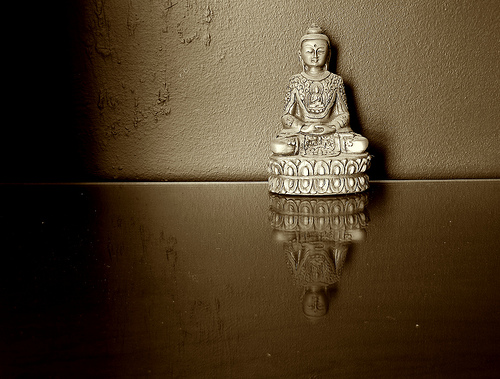Hey Gang,
Since December, I've been following the good people from Tiny Buddha on Twitter. For those of you who are unfamiliar, there are typically several posts throughout each day about improving and betterment (I don't want to say self-help, so I'm not going to. So, there!).
At the time that I came across Tiny Buddha, certain things in my life had changed... drastically and out of nowhere. I felt a number of emotions, and I honestly felt lost. Things have progressed so much from that time. I realize that I still have a good way to go, but I'm very excited about the prospects of what the future holds, and I'm happy that I get to move on with some tremendous experiences under my belt.
Tiny Buddha helped me make sense of some things over the past few months. It also helped calm me down, mentally, physically, and spiritually. I'd like to share some things that I came across on the site today. If you like it, let me know!
Tiny Wisdom: The Most Powerful Words for Healing

by Lori Deschene
“The practice of forgiveness is our most important contribution to the healing of the world.” -Marianne Williamson
Did you ever feel like there was a conversation you really wanted to have with someone, and yet a part of you felt it was unwise?
This is a feeling I know all too well.
When I was younger, I spent years fighting for an apology. It wasn’t until my whole world crashed down on my that I realized I’d become a tornado of anger and bitterness, destroying everything in my wake.
I eventually realized I needed to let go of the victim story I’d been carrying around, whether I got the closure I sought or not. For a long time, I thought I had let go.
But recently I realized I’ve been carrying around subconscious resentment, because a part of me still wants to hear those words I chased long ago—that I’ve always deserved respect and love, and I’ve never deserved to feel pain and shame.
So I put this all in a letter that I don’t intend to send. Despite having spent many years in therapy, and even more collecting self-help books, I’ve never done this before.
The other day was the first day I got it all down. I titled this Word Doc “What I Need to Say,” and I ended it with the following words:
“I wrote this letter because I want to heal more fully. A part of me feels that would be so much easier for me if you could look me in the eye and say, ‘I’m sorry.’
Then I remember I chose to stop pursuing an apology. So instead of pushing for it, I will say this: for all the anger, resentment, bitterness, and cruelty I directed toward you many years ago, I’m sorry. That’s not the person I want to be. The person I want to be isn’t a victim. She’s loving, compassionate, and kind.
The person I want to be has forgiven you, and loves herself for making that choice.’”
Somehow just expressing these thoughts makes me feel empowered—and all the more confident that I deserve my own respect. I am not forgetting that I was hurt. I am choosing to heal. I am choosing to be the type of love I’d like to receive.
Little in this world is more powerful than that.
Keep Moving Forward: 4 Tips to Enjoy the Journey More

Editor’s Note: This is a contribution by Janny Chang
“If we are facing in the right direction, all we have to do is keep on walking.” ~Proverb
Five years ago, I decided to fulfill my dream of getting a doctorate. I knew from talking to friends who took on the same endeavor that it would mean many sleepless nights and tons of reading and writing. But nothing prepared me for the path that lay ahead.
Graduate school is often compared to a marathon. Why? At each moment, when you think you’ve completed a major milestone, you realize you have a long road ahead. You just have to keep going and going.
First, there’s the coursework. I took on a full load and worked two part-time jobs.
Second, you really have to develop a thick skin because part of the experience of graduate school is humbling yourself before your professors and peers and learning to take constructive criticism. This also becomes an exercise in tuning into your own voice by learning how to distinguish between useless and useful feedback.
Third, your patience is tried and tested because it’s such a long road–an average five to seven years to completion in the United States.
I went into graduate school because I loved learning and I had a passion for my research. Along the way, as I buried myself in books, grading, and academic dialogue with my colleagues, I lost sight of this passion.
I became so focused on the destination that I forgot about the journey.
For my dissertation, I had to travel abroad to collect data. At first, I was enthused about the act of discovery. What kind of data would I find? What would I learn about the country, culture, and people living there? I was excited about the prospect of my research contributing to the good of mankind, even in some minute way. I harbored high hopes.
Gradually, this enthusiasm wore off. All I could think about was when I would finish.
I felt I had made too many sacrifices in the last five years and I was ready to be done. I wanted to get married and start a family and felt graduate school had hindered the development of my personal life.
While all my friends got mortgages and established their families, I had traveled the world and devoted myself to research and knowledge. I began to resent my career path.
Traces of this resentment showed up in my interactions with people abroad. When I conducted interviews, I sometimes found myself growing impatient. I wanted to be done. When this happened, my interviewees could sense my impatience and withdrew from me.
This was not the kind of person I wanted to be. I took on this “marathon” for passion and meaning in life and I was not about to lose that.
So, one day, I confided in one of my best friends online. I told him all my concerns and worries.
He asked me to remember the day when I received my admissions letter to graduate school.
I remember being elated. I shared the news with family. Though they were sad I would be moving from West Coast to the East Coast, they were overjoyed for me.
I remember my heart skipping a beat when I picked up books by professors whom I admired and wanted to emulate.
I remember the little things that made me smile, like learning a new idea which helped me see the world in a completely different way.
And I remember being fully aware that this new path I was taking would have ups and downs. I knew I would be able to weather the downs because the ups were worth it.
My best friend reminded me that I am right where I’m supposed to be. I chose this path for a reason. Sure, the path is filled with obstacles, but every path has its challenges. At least I get to do what I love.
I’m right where I’m supposed to be.
In the fast-paced, stressful modern life, it’s easy to forget that we’re facing the right direction and to keep walking. Here are a few tips to remind us that life, with its ups and downs, is the destination. All we have to do is remember.
1. Get a mission statement.
We cannot necessarily control the events around us, but we can control our attitude. Sometimes, all it takes is a little nudge to remind us of our initial attitudes when we took on the challenging path.Here’s what I do. I dig out my mission statement, just like the one Stephen Covey in The 7 Habits of Highly Effective People encourages us to do. In the book, he recommends that we make a poster complete with pictures which highlight and illustrate our core values.
If you don’t have a mission statement, you can make one!
What do you value in life? How do you picture your day-to-day routine? Why did you choose your career path? Then use magazine articles and cut out pictures which remind you of your values.
You can laminate your mission statement, like I did, and hang it up in your office. This will remind you when you’re facing the wrong direction or to keep walking in the right one.
2. Be inspired.
When I get that empty or bitter feeling of regret of the choices I’ve made in life, instead of turning to unhealthy doses of chocolate, I curl up in bed and watch inspirational movies. Movies which show strong characters facing one challenge after another and eventually being redeemed.My favorite movie is The Shawshank Redemption. Andy Dufresne, the main character, never loses hope. He faces the right direction and keeps walking. In the end, he prevails and along the way, strengthens his humanity by helping those around him. Choose your favorite movie and be inspired.
3. Get active.
I recently took on Muay Thai boxing. Me and 10 other guys. Although I’m winded in the first 15 minutes of conditioning, I have seen steady improvements in my physical strength and reflex.Doing boxing reminds me to keep going, even when I don’t feel like it. It also keeps me centered. Sparring is about anticipating your opponent’s moves, and you have to be in the moment to do that. Being mindful is the key lesson I have learned in boxing.
According to my instructor, a world-renowned coach who has trained with the current world champion, the sport is primarily about mental discipline. When he chants, “It’s all in your mind, keep going, you can do it,” I feel stronger.
I get a second wind not only in boxing, but in all areas of my life. Boxing and other forms of exercise remind us that our minds are stronger than we think and hard work does pay off in the end. We just gotta keep on going.
4. Take deep breaths and relax.
I’m more focused on the destination rather than the journey when I’m anxious and stressed. Collecting data and then synthesizing it into an academic article requires a lot of patience and hard work.When I get stressed, I just want to give up. I stop focusing on the present moment and I start becoming impatient about the future. I want to finish now. Then negative thoughts about the past—what choices I could and should have made—start creeping in. To counteract this, I have learned it helps to simply breathe.
My best friend took me through the visualization exercise. It’s something I have learned to do on my own. First, I close my eyes in a quiet setting. I turn on my favorite music.
Then I take a deep breath and then visualize myself when I first embarked on this journey. What did I feel? What was I thinking? The positive sensations start flooding in and I recall the joy I felt when I first took on this path. Sometimes, all we need is a simple, gentle reminder.
We remind ourselves to trust our instincts and keep forging ahead. This is all part of the beautiful journey called life.

No comments:
Post a Comment